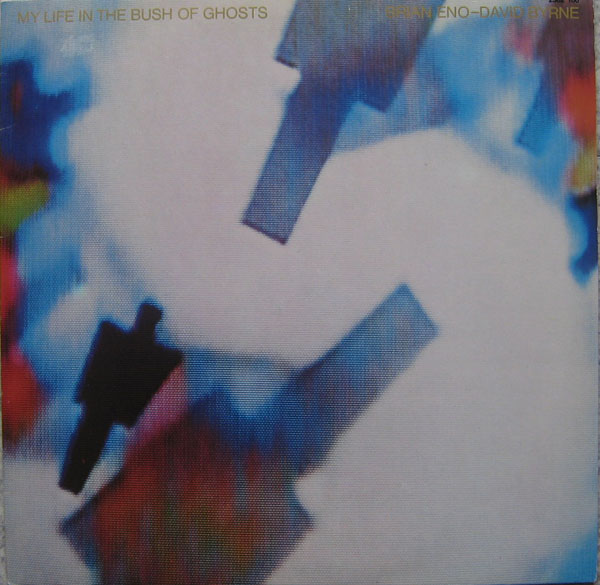This dense and funky collaboration exorcised the demons and tapped into something primal with its extensive use of “found vocals and objects”. 'My Life in the Bush of Ghosts' influenced several movements in music by drawing together the ambient experimentation of Eno with Byrne's predilection for polyrhythmic world music. It sat on the shelves for months as record companies sought legal permission for the extensive audio samples.
Byrne says: "I still feel like if I can get a song to work with, say, a basic beat, a rhythm, some chord changes, and a melody, a vocal melody-- if it works with that, then I feel it's written and there's something there. So I intentionally don't get involved with arranging stuff or fussing over the sounds and the edits and the beats too much, at least not in the beginning, because I feel like then you can fool yourself that you've got something there, when you might not. In a certain way, you get some new tools to work with, but I don't know if it ultimately makes the creative process any easier...The idea of making music from an imaginary culture was to give ourselves a set of restrictions and parameters within which to work. Otherwise, we might have just gone on all kinds of creative detours, some of which might have been interesting. But better we confine ourselves to something. Which kind of worked. At least it kept us within bounds for a while, [and] by the time we abandoned that whole idea, which was pretty early on, we already had a direction."
Eno elaborates: "We are both fairly disenchanted with ordinary song structures - the voice you record is invested with your own personality. What we wanted was to create something more mysterious, and by taking voices out of context, but featuring them dominantly as the main vocal performance, you can go on to create meaning by surrounding the voice with a musical mood. In a way it was an experiment to see if you can create fairly sophisticated moods with voices outside their linguistic meaning. Basically I'm so fed up with reading reviews of records that concentrate on the lyrics, quoting them as if they had some great relevance, but ignoring the music."
http://davidbyrne.com/
http://brian-eno.net/
'America Is Waiting' samples an "Unidentified indignant radio host"
'Mea Culpa'
"Inflamed caller and smooth politician replying"
'Regiment' includes Lebanese mountain singer Dunya Yusin and Michael "Busta Cherry" Jones on bass.
'Help Me Somebody'
Reverend Paul Morton
'The Jezebel Spirit'
Unidentified exorcist
'Qu'ran'
Algerian Muslims chanting the Qur'an.
The song was removed from later editions of the album. Byrne explains: "Way back when the record first came out, in 1981, it might have been ’82, we got a request from an Islamic organization in London, and they said, 'We consider this blasphemy that you put grooves to the chanting of the Holy Book.' And we thought, 'Okay, in deference to somebody’s religion, we’ll take it off.' You could probably argue for and against monkeying with something like that. But I think we were certainly feeling very cautious about this whole thing. We made a big effort to try and clear all the voices, and make sure everybody was okay with everything. Because we thought, 'We’re going to get accused of all kinds of things, and so we want to cover our asses as best we can'.” So I think in that sense we reacted maybe with more caution than we had to. But that’s the way it was.”
'Moonlight In Glory'
The Moving Star Hall Singers, Sea Islands, Georgia
'The Carrier'
Dunya Yusin
'A Secret Life'
Samira Tewfik, Egyptian popular singer
'Come With Us'
Unidentified radio evangelist
http://davidbyrne.com/
http://brian-eno.net/
'America Is Waiting' samples an "Unidentified indignant radio host"
'Mea Culpa'
"Inflamed caller and smooth politician replying"
'Regiment' includes Lebanese mountain singer Dunya Yusin and Michael "Busta Cherry" Jones on bass.
'Help Me Somebody'
Reverend Paul Morton
'The Jezebel Spirit'
Unidentified exorcist
'Qu'ran'
Algerian Muslims chanting the Qur'an.
The song was removed from later editions of the album. Byrne explains: "Way back when the record first came out, in 1981, it might have been ’82, we got a request from an Islamic organization in London, and they said, 'We consider this blasphemy that you put grooves to the chanting of the Holy Book.' And we thought, 'Okay, in deference to somebody’s religion, we’ll take it off.' You could probably argue for and against monkeying with something like that. But I think we were certainly feeling very cautious about this whole thing. We made a big effort to try and clear all the voices, and make sure everybody was okay with everything. Because we thought, 'We’re going to get accused of all kinds of things, and so we want to cover our asses as best we can'.” So I think in that sense we reacted maybe with more caution than we had to. But that’s the way it was.”
'Moonlight In Glory'
The Moving Star Hall Singers, Sea Islands, Georgia
'The Carrier'
Dunya Yusin
'A Secret Life'
Samira Tewfik, Egyptian popular singer
'Come With Us'
Unidentified radio evangelist


No comments:
Post a Comment